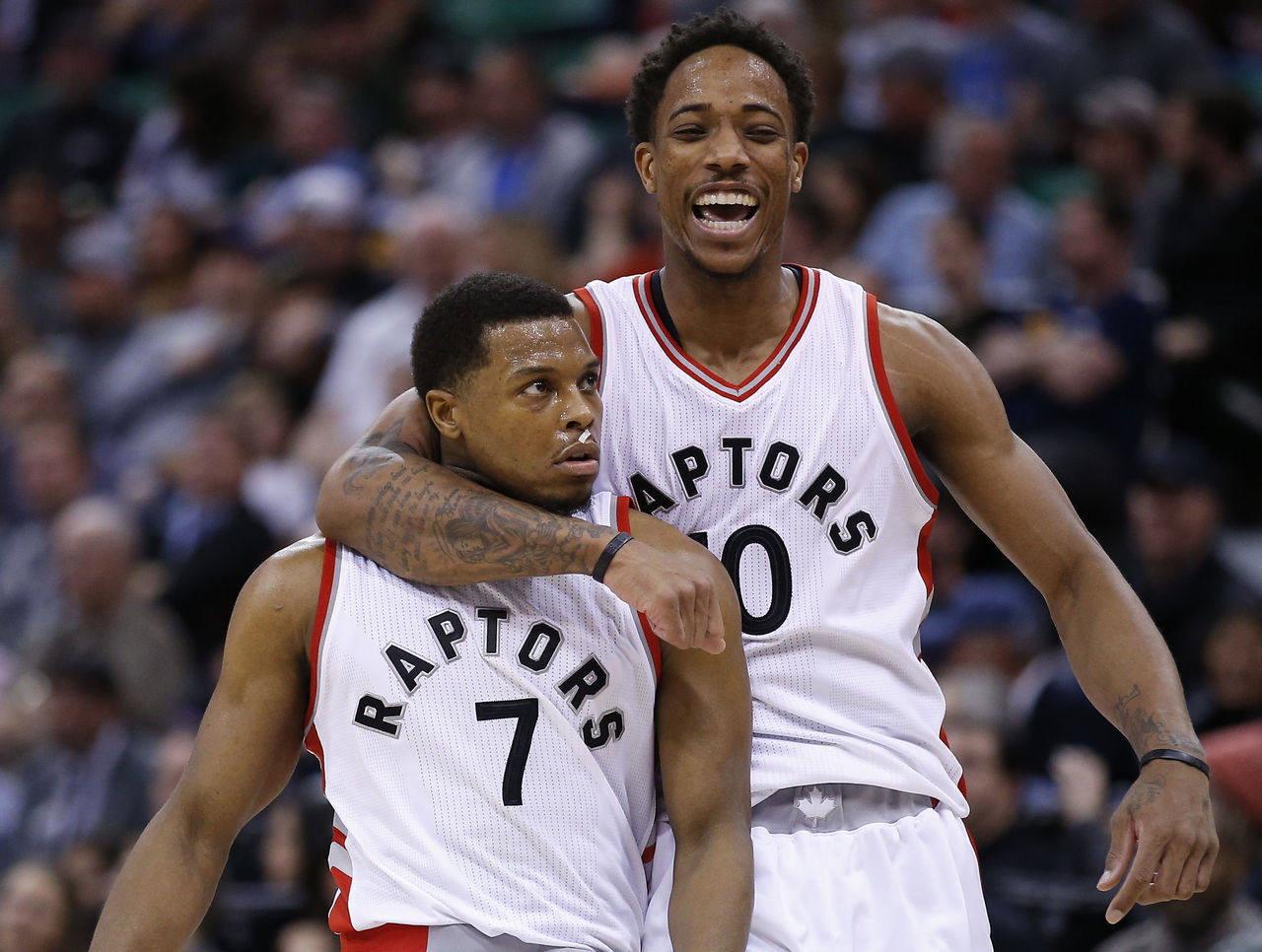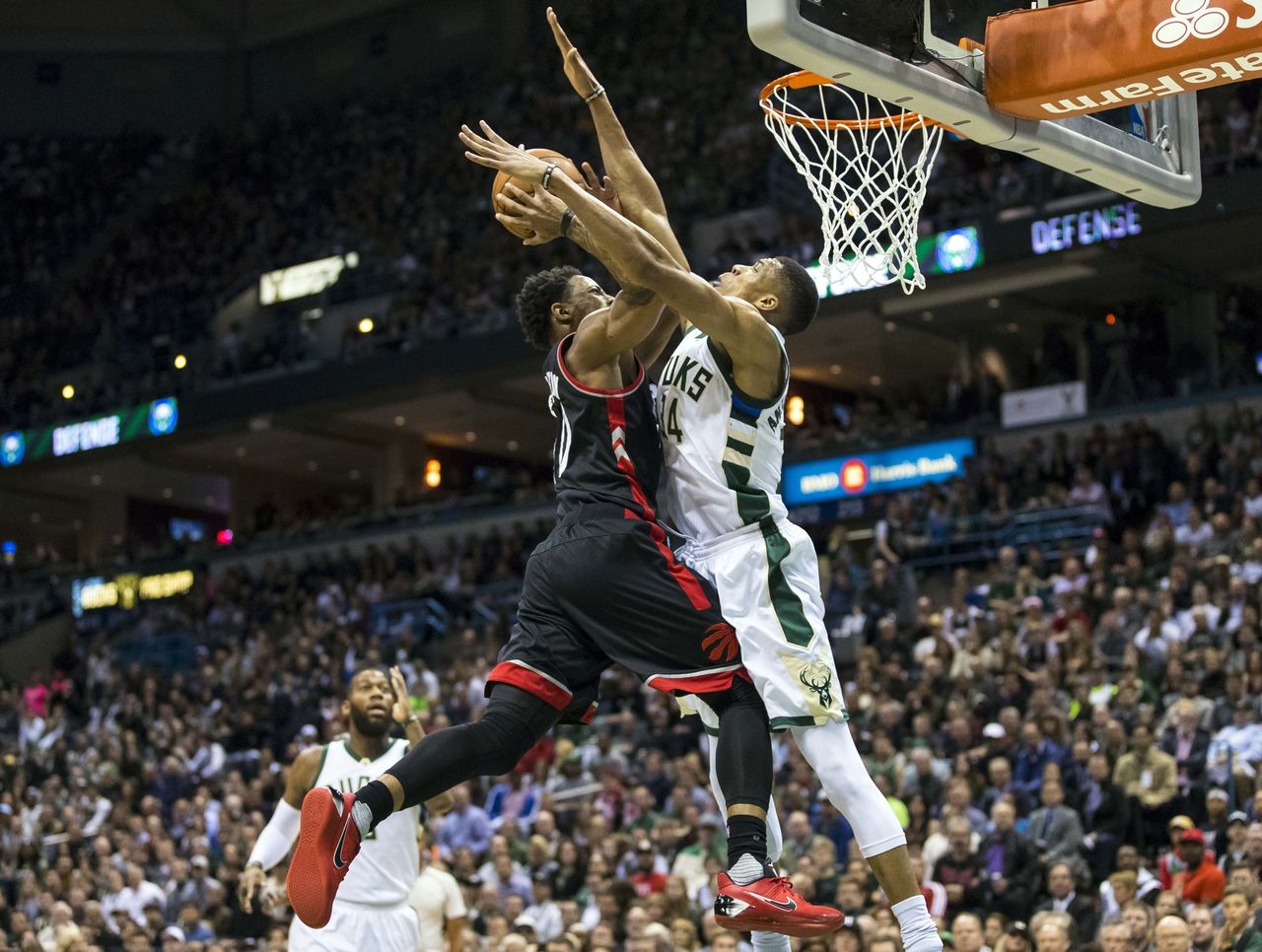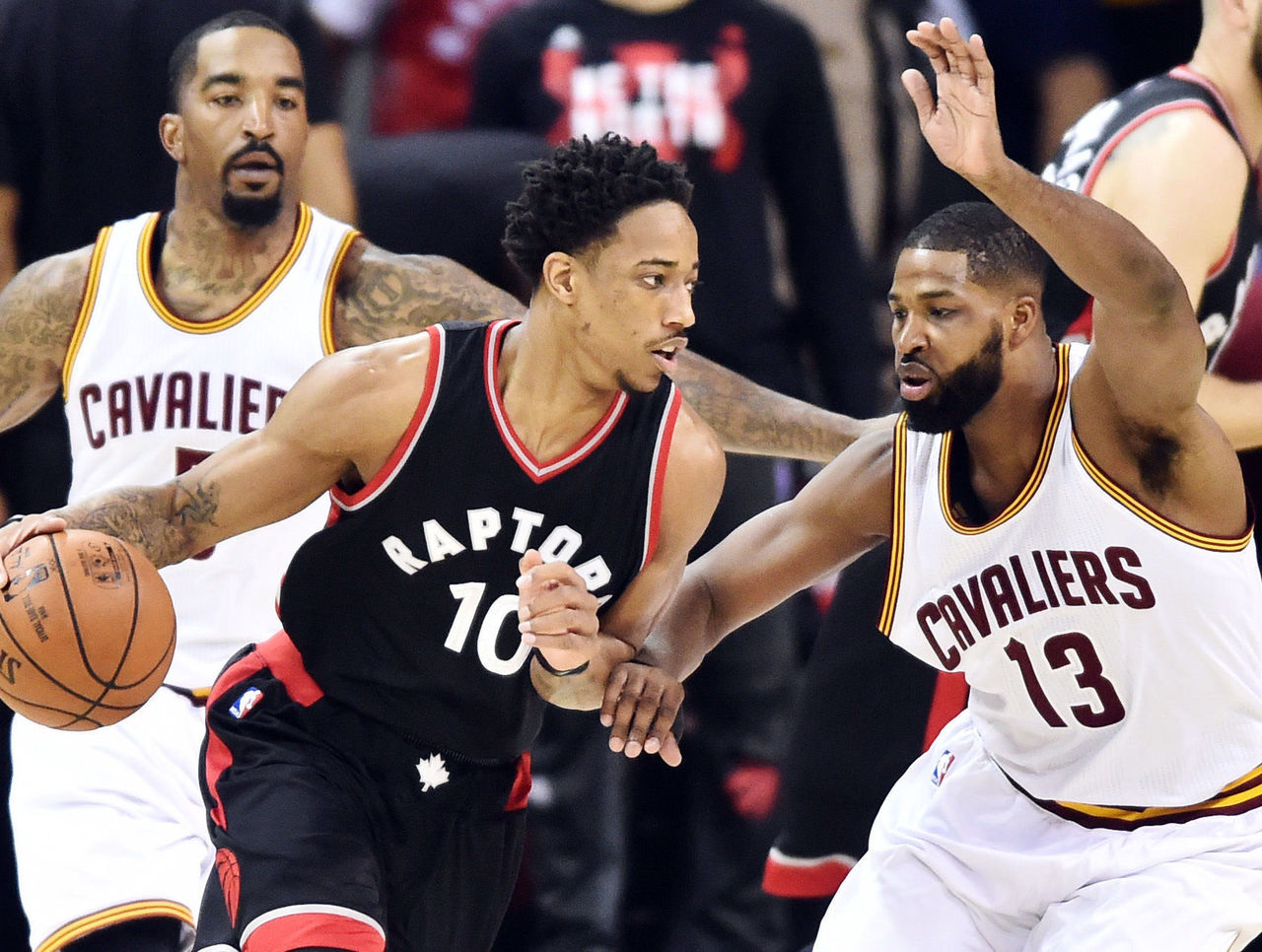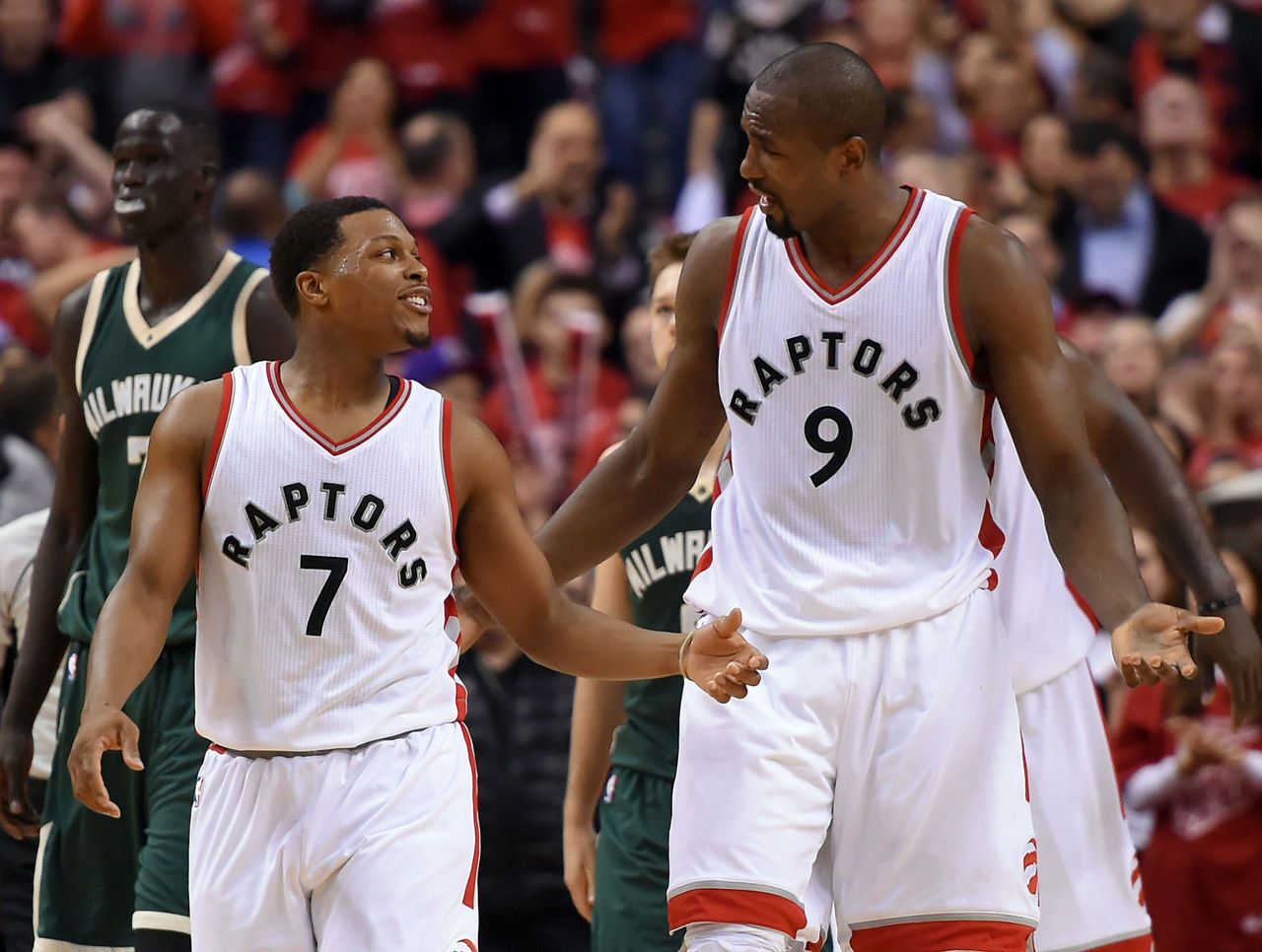For Raptors' core, miraculous 4-year run has been clouded by bad optics
It's hard to evaluate where, exactly, the Toronto Raptors stand right now, as they approach an offseason crossroads that will irrevocably shape the franchise's future.
That's partly because their unceremonious playoff ouster - a clean sweep at the hands of the defending champion Cleveland Cavaliers - came with a couple caveats. First, franchise point guard Kyle Lowry sat out Toronto's two home games, both of which looked winnable for long stretches even without him. And second, some of what the Cavs did in the series - namely, hitting contested threes at an astronomical rate - had nothing to do with the Raptors, who, despite losing the 3-point scoring battle by a historic margin, actually generated more "wide open" looks from long range, per NBA.com. The Cavs shot 46.6 percent from beyond the arc in the series (including a 47.5 percent mark on contested threes), and posted a better true shooting percentage as a team (63.7) than Steph freaking Curry managed this season.
But the picture of these Raptors was fuzzy even before the Cavs ripped their throats out, and probably would've been even if they'd dodged those extenuating circumstances and made the series a bit more competitive. The fact would remain that for the fourth straight year, the formula that brought Toronto regular-season success proved decidedly less potent in the playoffs.

This was the fourth straight year the Raptors finished bottom-five in postseason net rating, despite having had home-court advantage in five of the seven series they played; the fourth straight year Lowry and DeMar DeRozan both saw their efficiency tail off after the regular season; the fourth straight year the team's offense cratered (and the third straight it scored at least eight fewer points per 100 possessions) in the playoffs; and the fourth straight year in which the team alternated moments of brilliance and incompetence, blurring the line between pleasant surprise and vexing disappointment.
Now, with Lowry's free agency looming, and several other significant roster/payroll decisions to be made, the Raptors may be coming to the end of their run with this core. It's a run that began in earnest with the early-season trade of Rudy Gay in 2013, and from there took shape entirely by accident. Lowry was practically a New York Knick before James Dolan famously felt a chill run up his feet, wary of being fleeced by Masai Ujiri again. It turned out Ujiri's best move was the one Dolan prevented him from making.
Lowry subsequently morphed into an All-NBA-caliber point guard, DeRozan took on an increased offensive load and sprinted with it, Patrick Patterson became a crucial defensive cog and a much-needed stretch-four after coming over in the Gay trade, and the Raptors turned a would-be tank job into the most successful regular season (at the time) in franchise history. It was no outlier, either. Since the start of that groundbreaking campaign, no Eastern Conference team has won as many regular-season games as the Raptors, nor has any other franchise in the conference finished top-10 in offense each season, nor opened each of the past four postseasons at home.
The Raptors have won more games in each of the past four campaigns than they'd won in any season prior to 2013-14. They've put together two 50-plus-win campaigns, which is two more than the franchise had ever managed before. They've won three best-of-seven series, which is three more than they'd ever won previously. This has, undeniably, been the Raptors' Golden Age.
And yet. And yet.
And yet, each season the Raptors have practically begged doubters to cry fool's gold. Even as they've gradually assembled the most talented roster in team history, even as they've grown into something resembling a model franchise, they've continued their annual spring tradition of confounding observers and fans. They've lost every Game 1 of every series they've played, creating the impression that they're chronically under-prepared, for their opponent and for the moment. Even in the series they've managed to win, the Raptors have developed a penchant for shooting themselves in the foot, and more so than discovering how to avoid doing that, their learning curve has involved figuring out on the fly how to treat the wound, and then willing themselves to walk again.

Their six-game, whiplash-inducing first-round win over the Milwaukee Bucks this year technically counted as progress - it was the first playoff series the franchise ever won in fewer than the maximum number of games - but it felt very much like an extension of Toronto's 2016 postseason, which could not have created more dissonance between its outcomes and its optics. (To briefly recap said playoff run: The Raptors were 12 minutes - and perhaps one poor Frank Vogel lineup choice - from going back to Indiana down 3-2 to the seventh-seeded Pacers in the first round, and even after surviving that game, got blown out in Game 6 and nearly blew a 14-point fourth-quarter lead in Game 7. They then scratched out an unsightly seven-game win over a badly banged-up Miami Heat team, got thrashed by 50 points in their first two conference finals games against the Cavaliers, somehow stormed back to tie that series, and got thrashed again in the next two games to complete the most lopsided six-game series in league history. In the end, the Raptors came up just two wins short of the Finals, despite being outscored in the playoffs by an average of more than four points per game.)
Their Game 6 win over the Bucks was a perfect microcosm of their past two postseasons as a whole. They showcased their best and worst selves in the span of 48 minutes, and in the end, after enduring a near-unfathomable meltdown, they somehow collected themselves, bound up the bullet wound in their foot, and hobbled across the finish line. Leave it to these Raptors to tease the potential height of their ceiling in the same game they nearly fall through the floor. Leave it to these Raptors to make what should've been a joyous win feel like a loss, while simultaneously turning what could've been an epic cataclysm into an exercise in resilience.
That resilience counts for something, too, no matter the extent to which their wounds have been self-inflicted. Even the way they went out against the Cavs this season - competing for seven quarters of their two hopeless, Lowry-less games - was inspiring, in its way. The Raptors have consistently played best with their backs against the wall, and that hasn't just been a playoff phenomenon. For the second straight season, they led the league in comeback wins from double-digit deficits - a distinction that, of course, was only made possible because they dug themselves so many holes to begin with. Their most inspired efforts have often come immediately on the heels of their least. They've been reliably unreliable, and predictably unpredictable. They've been possibly the most mentally tough mentally fragile team in the league.
Optical Illusions
The optics at play here have as much to do with aesthetics as pop psychology. The eye test has consistently struggled to take the proper measure of these Raptors teams, particularly in regard to their offenses. While Toronto is certainly capable of playing up-and-down, pass-happy, free-flowing, aesthetically pleasing ball, those tenets are not exactly embedded in the proverbial Dino DNA. The Raptors' offense, in what might be called the Lowry-DeRozan-Dwane Casey era, has been methodical and muddy, predicated on hunting mismatches, attacking in isolation, and getting to the free-throw line.

They don't sling threes or push the pace or swing the ball around the way cutting-edge offenses like Cleveland's and Golden State's do. Their assist rate this year was the lowest any team has produced in 13 years. They walk the ball up and take a lifetime to get into their sets. They dribble and dribble, screen and re-screen, flail and foul-bait. It can look ungainly even when it succeeds. When it fails, it looks approximately like a flaming garbage can rolling down a hill at a landfill site that's also on fire. It's why Casey often gets pilloried for having a flimsy playbook and little offensive imagination.
For all that, though, the Raptors have finished no worse than sixth in offensive efficiency over the past three seasons. For the first two months of this campaign, they were running literally the most efficient offense in recorded history. They consistently rank among the league's best teams at scoring out of timeouts and in crunch time, mainly because they know as well as any team how to play to their strengths. Casey likes to remind people that there's more than one way to skin a cat, and while that metaphor feels apt mainly because of how grisly his team's offense can look, it's true that Toronto has often thrived because of, not in spite of, its affinity for unpretty basketball.
But we'd still prefer our eyes be able to tell us concrete truths. Things that look like they work, should work; things that look like they don't, should not. We want to have our perceptions validated. We want to understand what we're watching. Maybe that's why there's a particularly loud chorus of anti-Casey, anti-Raptors sentiment each spring, when it seems the eye test is finally borne out, and the team's offense - owing to some combination of additional scouting, enhanced competition, and perhaps some stakes-induced yips - collapses on itself.
Some of the Casey criticisms are justifiable - he's been more reactive than proactive, too stubborn with his rotations, and has overplayed bad lineups - and there's a decent chance he'll end up wearing this latest playoff disappointment when it comes time for Ujiri to chart the team's path forward. But it would be unfair not to acknowledge the extent to which the Raptors' personnel has dictated their style.
They've been light on playmaking, but in Lowry, DeRozan, Jonas Valanciunas, Cory Joseph, and Lou Williams, they've had guys who excel as one-on-one scorers. They've been largely bereft of ultra-fast uber-athletes who can dominate in transition and change the composition of the floor (they traded one of the few they did have, Terrence Ross, to get Serge Ibaka this season), but they've had players who can create shots for themselves in the half court, and make something out of nothing late in the shot clock. They've lacked reliable volume 3-point shooters, but they've had players who can both take advantage of the mid-range looks teams willingly cede these days, and tilt the math back in the Raptors' favor by piling up free throws.
It's worth noting, too, that even as their continued stumbles are taken as further evidence that their formula can't hold up to postseason scrutiny, the Raptors still found success with their bread and butter. They exit this year's playoffs ranked first of 16 teams in scoring efficiency in isolation, with 1.13 points per possession.
The road ahead

Maybe you've heard: The Raptors have kind of a big summer looming, as Ibaka, Patterson, and P.J. Tucker will join Lowry in free agency. Those players will have to decide if this situation is tenable, while the front office will have to decide how much they're worth. Ownership will also have to decide whether it wants to pay the luxury tax to keep the band together. A lot of tough questions will have to be answered.
This is no longer a young team finding its way and learning together; this group is, more or less, what it is. But there are any number of things one can choose to take away from the Raptors' playoff performances, given how rarely their play has proven predictive - from series to series, game to game, or even quarter to quarter. If ownership does decide to pony up, will it be putting smart money on a team that's proven capable of bailing itself out of trouble, or gambling recklessly on one that keeps getting itself into trouble in the first place? Taken as a whole, are the Raptors greater or less than the sum of their parts?
Their offensive system, and even their befuddling postseason forays, have still produced results over the past two years. At the end of the day, they've still won the series they were expected to win, and lost those they were expected to lose. The ends - at least to the extent they can be quantified by playoff gate revenues and television viewership - have justified the means. And it's not as if the process has been objectively unsound. It's just rarely been pretty, or comfortable, or especially confidence-inspiring.
Lowry has said that all he cares about at this point is winning a ring, and if he decides trying to close the gap on LeBron James and Co. is a fool's errand, all of the Raptors' other offseason concerns effectively become moot. They have no realistic means of replacing his production, and can't be a win-now team without him. If Lowry's gone, it's likely all the Raptors' free agents are, too. If, however, he's willing to stick around and puts the $200-million ball in the front office's court, the franchise will have to take a long look in the mirror.
Ultimately, the Raptors will have to ask themselves whether their core is sustainable and talented enough to contend, provided the roster is suitably filled out in the margins; or, conversely, whether the core, for all the success it's achieved, was always destined to end up here - as another cast-down pretender that had stood out in a weak conference, only to be humbled once the games really became consequential. If they decide it's the latter, are they still willing to play out the string on this window of good-not-greatness? Is the organizational equity they might buy with a couple more years of second-tier competitiveness worth the cost?
It's been, in many ways, an incredible four-year run for the Raptors. That it was spawned by a failed teardown makes it almost miraculous. They should, by all accounts, be one of the league's great feel-good stories. But on the micro level, the optics that have shrouded the team's performance, particularly in the playoffs, have made it all feel like a bit of a letdown. And all parties involved in the uncertain offseason ahead will have to decide how much that matters.
(Images courtesy: Action Images)
HEADLINES
- NBA Cup quarterfinals: Heat-Magic, Knicks-Raptors, Suns-Thunder, Spurs-Lakers
- NBA fines Magic's Bane $35K for throwing ball at Anunoby
- Projecting rosters for USA vs. World All-Star Game
- Suns overcome Edwards' 40 points to snap T-Wolves' 5-game win streak
- Raptors' Barrett to miss at least another week due to knee injury